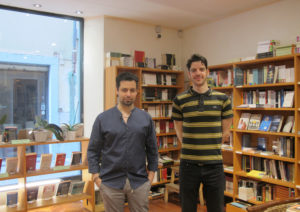The Paperback Exchange: A Fresh New Start

“This bookstore, we could say, was like a series of fortunate events,” says Icaro Rotunda. He and Gianluca Romeo took a leap of faith when they bought the Paperback Exchange bookstore (via delle Oche 4/r) at the beginning of May 2019. With no background in managing or owning a store, the two entrepreneurs have faced this challenge head on and have maneuvered their way into success.
After living in Montreal, Canada for a year, where his mother is originally from, Rotunda moved back to Florence in 2016, the city where he was born and raised. Although his love for Canada doesn’t falter, he felt as though he had to come back to his true home. Upon his return, he secured a job at the Paperback Exchange under the previous owners so he could make money while completing his studies in music and language.
Emily Rosner was one of the founders of the Paperback Exchange and she had welcomed Rotunda with open arms as an employee. She was born and raised in New York and transferred to NYU to study English literature. During a trip through Europe with a friend from school, Rosner met her future husband, Maurizio Panichi, at a hostel in Italy. She decided to move to Florence in order to build a relation with Panichi and to get away from political unrest occurring in the U.S. at the time.
Rosner and Panichi had no plans to open a bookstore until Rosner traveled to Boston for the opening of her parent’s branch of their book exchange store, Book Rack. This gave Rosner the idea to open an English-language bookstore in Florence in 1979. From there on, the couple spent the next 40 years building up the business with great success.
Once Rotunda saw the for-sale sign that Rosner and Panichi put up, it sparked the sudden idea to buy the business and take it under his wing. He said that this decision was very unexpected, especially since he had no experience as a shop owner. Although the undertaking was formidable, Rotunda said that the transition from being an employee to being a proprietor was small. He already knew his way around and was familiar with the system; however, there was more he had to learn: how to work with the invoices, accountants, and to manage a business was and still is the hardest part about this new adventure, he said.
With new management comes development. The biggest change that will be made involves marketing and communication: a Facebook page and an Instagram account are in the works as well as a new website. Rotunda explains that the previous owners had a website, however, it was used infrequently. The business partners are working on making a new one, which will see many improvements and is projected to be launched in September. Although some changes are planned, Rotunda says that they want to refrain from making many physical alterations to the premises because they want to keep it familiar to the customers who have been coming for years.
In addition to improving communication, the new owners are planning many cultural events such as poetry, music, photography, and presentations that are to be held in a new open space that they have created in the store. (sierra case)
